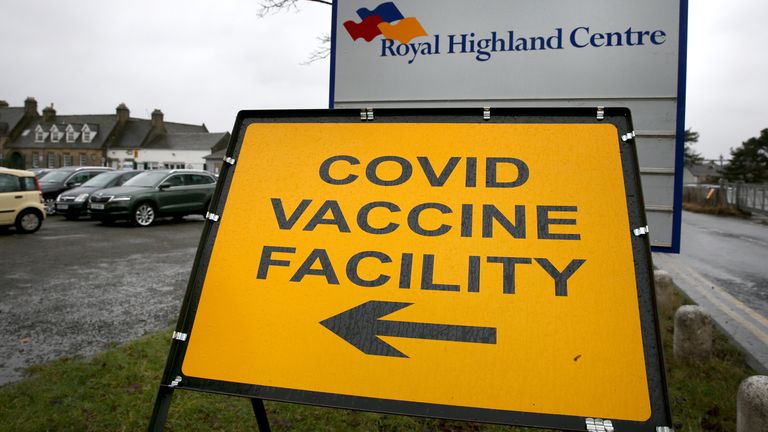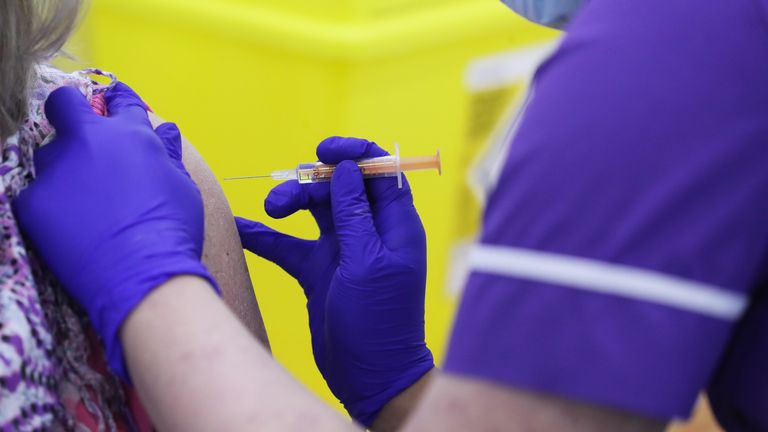Every adult in the UK could receive both doses of a coronavirus vaccine by August or September "or maybe sooner if we need to", the head of the UK's vaccine taskforce has told Sky News.
Clive Dix, who runs the body which identifies and buys vaccines on behalf of the UK government, said he was sure there would not be any supply problems.
Asked if vaccine supply would arrive at the rate promised over the next three to six months, he replied: "Yes, definitely.
"We are confident within the vaccine taskforce now that the supply we're going to get will take to us to a position where we can vaccinate as many people as the UK wants to vaccinate."
Pressed if this meant the vaccine taskforce was confident every adult would get two jabs, Mr Dix told Sky News: "We're probably talking August time or September time all done, maybe sooner if we need to."
So far more than 15 million people have had a coronavirus vaccine, with the UK government saying everyone in the top four priority groups has now been offered a first dose.
The next target is for all remaining five priority groups to be offered a vaccine by the end of April, then all remaining adults in the UK reached by autumn.
Asked if supply might slow in the coming weeks, as some devolved administrations have warned, Mr Dix said: "No. That might be logistics."
He explained that the taskforce was confident in the supply of vaccines due to the "portfolio approach" it took to securing COVID jabs, with the UK having secured access to seven different vaccines.
"The ones that are being rolled off the line at the moment, they are doing very well," he said.
"Of course they could have a manufacturing problem, like you do with any manufacture of anything but with vaccines being more complicated, you could have a problem.
"But because we've taken a portfolio approach we've got other vaccines that are going to be approved in the very near future.
"And, once they're approved, we've got those as back up. It's a very low risk we wouldn't have vaccine."
Mr Dix also revealed that new vaccines could be approved in just six to eight weeks in the event new variants are discovered, rather than the year it took to get the first vaccines.
In the event of a new variant, Mr Dix said he thought "you could get to 40 days to having it tested in the clinic and know it works".
He added: "Then manufacture would take another period of time because you wouldn't manufacture huge amounts before you know it works.
"So it is a short period of time, it's not waiting a year like this time we did this time."
He added: "I think 40 days would be a real stretch but we would aim for something as good as that. But certainly within 60 days and then, after that, we would start the manufacturing."
All the early data about the vaccines suggests they are as effective as the government hoped, Mr Dix said.
"You can never say for certain until you've got all of the data in, but all of the signs are incredibly encouraging," he added.
"It's looking like these vaccines are doing exactly what we expect - infection rates are going down, hospitalisations are going down and people are remaining - I wouldn't say virus-free, because we don't know that, but we know that they're not getting serious disease.
"That's what we were trying to do.
"The important thing is, if you think about the flu vaccine, the flu vaccine doesn't stop everybody getting flu. But it stops it being a severe disease and it stops people dying.
"Remember that flu has been a pandemic, it has killed people - it has quite viciously killed a lot of people - so we've got over that one now.
"We work with the disease and it's fine, we live with it and the health system deals with it. We want to do the same with this virus."
Mr Dix did urge politicians not to set overly ambitious targets however.
He said: "I think the thing people have to recognise is that if you keep pushing the system too hard, something might break and then you've got a problem.
"I think the rate we're doing at the moment is getting us to the right place and I don't think we should push it too hard.
"We should push it as hard as we can, along with supply.
"If we say to the manufacturers 'double your output to us next week' - they might push their system and it might break.
"So we've got to do it sensibly. What we've done here is built something like we've built a Formula One car that can go 300mph.
"I wouldn't like to be the person just sat in it with my foot to the floor, because if it's never been tested before it may not work."
Subscribe to the Daily podcast on Apple Podcasts, Google Podcasts, Spotify, Spreaker
The vaccine taskforce also helps with international supplies of coronavirus vaccines as part of their remit.
However Mr Dix said: "We definitely want to vaccinate our own population first.
"It would be a bit weird to have people still waiting and giving the vaccines to others."
https://news.google.com/__i/rss/rd/articles/CBMigAFodHRwczovL25ld3Muc2t5LmNvbS9zdG9yeS9jb3ZpZC0xOS1ldmVyeS11ay1hZHVsdC1jb3VsZC1yZWNlaXZlLWJvdGgtamFicy1ieS1hdWd1c3Qtc2F5cy1oZWFkLW9mLXVrcy12YWNjaW5lLXRhc2tmb3JjZS0xMjIyMDE0OdIBhAFodHRwczovL25ld3Muc2t5LmNvbS9zdG9yeS9hbXAvY292aWQtMTktZXZlcnktdWstYWR1bHQtY291bGQtcmVjZWl2ZS1ib3RoLWphYnMtYnktYXVndXN0LXNheXMtaGVhZC1vZi11a3MtdmFjY2luZS10YXNrZm9yY2UtMTIyMjAxNDk?oc=5
2021-02-16 23:26:15Z
52781382334136




Tidak ada komentar:
Posting Komentar